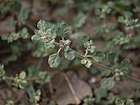Note: This is a project under development. The articles on this wiki are just being initiated and broadly incomplete. You can Help creating new pages.
Glinus lotoides
Glinus lotoides is a decumbent, semi-prostrate or prostrate spreading annual plant, branched from the base, with stems 15 - 30cm tall. The plant is sometimes gathered from the wild for its edible leaves.
Contents
[hide]- 1 Uses
- 2 Parts Used
- 3 Chemical Composition
- 4 Common names
- 5 Properties
- 6 Habit
- 7 Identification
- 8 List of Ayurvedic medicine in which the herb is used
- 9 Where to get the saplings
- 10 Mode of Propagation
- 11 How to plant/cultivate
- 12 Commonly seen growing in areas
- 13 Photo Gallery
- 14 References
- 15 External Links
Uses
Abdominal disorder, Diarrhoea, Bilious attacks.[1]
Parts Used
Chemical Composition
Common names
| Language | Common name |
|---|---|
| Kannada | ಚಂದ್ರ ಕಾಸಿ ಸೊಪ್ಪು Chandra kaasi soppu, ಕಾಗ ಪುರಳೆ ಗಿಡ Kaaga purale gida |
| Hindi | Gandhi buti |
| Malayalam | |
| Tamil | Ceruppatai, Ciru-ceruppatai |
| Telugu | Chadrasi koora, Thella poraku |
| Marathi | Kadvi bhaji |
| Gujarathi | Dholo okharad, Mitho okharad |
| Punjabi | |
| Kashmiri | |
| Sanskrit | |
| English | Lotus sweetjuice |
Properties
Reference: Dravya - Substance, Rasa - Taste, Guna - Qualities, Veerya - Potency, Vipaka - Post-digesion effect, Karma - Pharmacological activity, Prabhava - Therepeutics.
Dravya
Rasa
Guna
Veerya
Vipaka
Karma
Prabhava
Habit
Identification
Leaf
| Kind | Shape | Feature |
|---|---|---|
| Round or Wedge | 0.6 to 1.8cm |
Flower
| Type | Size | Color and composition | Stamen | More information |
|---|---|---|---|---|
| The inflorescence is a tight Cluster of five to ten small flowers, Each flowers has | {{{5}}} |
Fruit
| Type | Size | Mass | Appearance | Seeds | More information |
|---|---|---|---|---|---|
| Less than 1mm long | Many seeds |
Other features
List of Ayurvedic medicine in which the herb is used
Where to get the saplings
Mode of Propagation
How to plant/cultivate
Commonly seen growing in areas
Woodlands, Mixed savannah woodland, In grassland, Riverine forest, River banks.
Photo Gallery
References
External Links
Categories:
- Ayurvedic Herbs known to be helpful to treat Abdominal disorder
- Ayurvedic Herbs known to be helpful to treat Diarrhoea
- Ayurvedic Herbs known to be helpful to treat Bilious attacks
- Herbs with Young leaf used in medicine
- Herbs with Stem used in medicine
- Herbs with common name in Kannada
- Herbs with common name in Hindi
- Herbs with common name in Tamil
- Herbs with common name in Telugu
- Herbs with common name in Marathi
- Herbs with common name in Gujarathi
- Herbs with common name in English
- Habit - Annual
- Index of Plants which can be propagated by Seeds
- Herbs that are commonly seen in the region of Woodlands
- Herbs that are commonly seen in the region of Mixed savannah woodland
- Herbs that are commonly seen in the region of In grassland
- Herbs that are commonly seen in the region of Riverine forest
- Herbs that are commonly seen in the region of River banks
- Herbs





